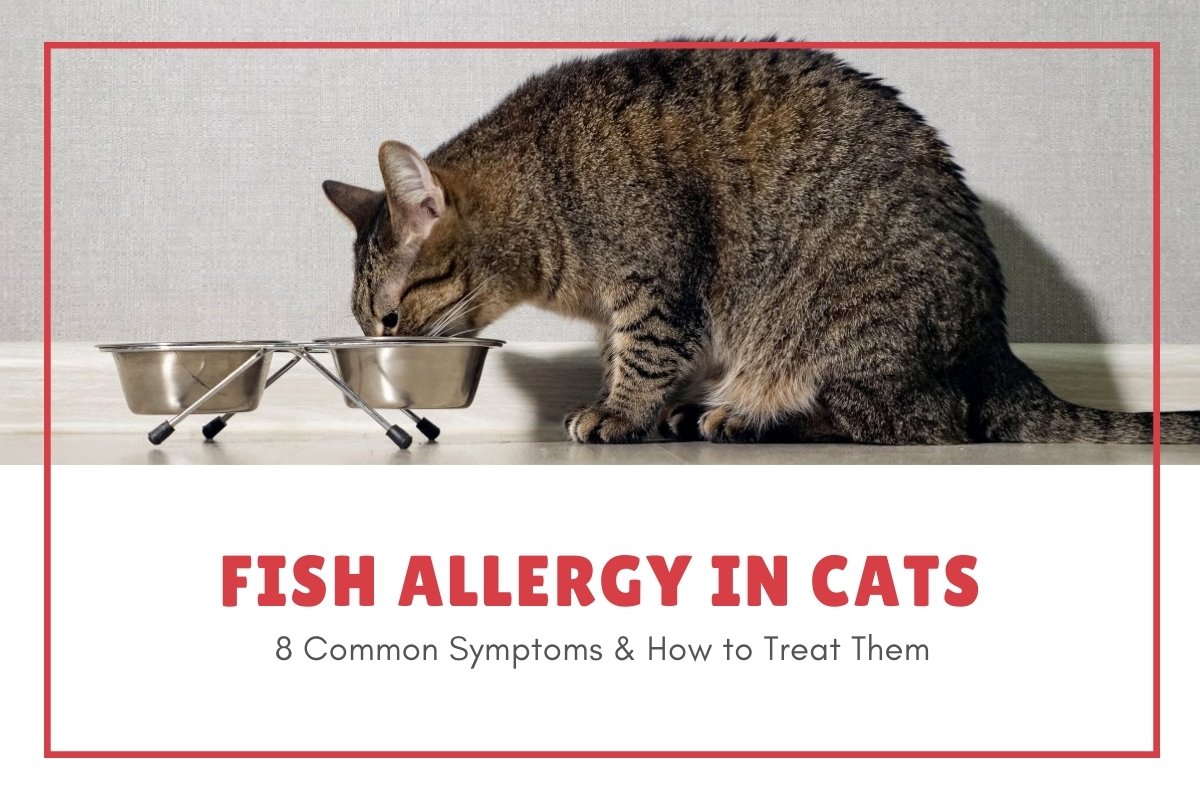Most cats love fish. Fish is often the main source of protein in wet and dry cat food. However, can cats develop a fish allergy? After all, cats are mammals, and they have immune responses similar to human beings.
In this guide, we discuss whether or not cats can have a fish allergy, the symptoms of fish allergy in cats, and how to treat them. As a pet owner, you are responsible for monitoring your cat’s diet and ensuring it does not show an adverse reaction to its food.
Can Cats Have Allergies?
Just like human beings, cats have an immune system as well. This means that they have various reactions to different kinds of foods. Fish allergy in cats happens when your feline friend’s immune system reacts negatively or adversely to a fish (or a certain substance found in fish).
Allergies are completely normal since every individual body is unique and responds differently to different foods. In addition, you should be able to distinguish between a fish allergy in cats and mere food intolerance for fish.
If your cat is intolerant to fish, this means that its body is not reacting well to it, but there is no immune system issue involved. Irrespective of whether your cat has a fish allergy or intolerance, you should steer clear of fish products once you diagnose this.

Why Is a Fish Allergy Alarming?
Fish allergy in cats can be alarming for several reasons. Firstly, a lot of cat food contains fish products. This is because cats are natural carnivores, and proteins form the bulk of their diet.
Fish is a convenient and cost-effective source of protein, which is why it is an integral part of so many feline diets. If your cat has a fish allergy, this could mean that there are a lot of foods that it cannot consume, so you need to be careful about which diets you need to avoid.
Secondly, a fish allergy in cats can often have extremely severe symptoms, which can even prove fatal if they are left untreated for too long. This is why these allergies should be diagnosed as soon as possible since allowing them to continue for too long can make your cat weak and unhealthy.
What Are the Symptoms of a Fish Allergy?
So how do you find out if your feline friend has an allergy to fish? Vets diagnose a food allergy by exposing the cat to various foods in controlled quantities and examining them for any adverse reactions.
However, we do not have the skills, equipment, or expertise to carry out such diagnostic procedures at home. This is why the only way you can spot a fish allergy in cats is to look out and see if your cat displays the following symptoms on eating fish:
1. Itching
Cats love to groom themselves, and they can sometimes be seen scratching their skin. However, if your cat is itching and scratching its skin excessively, then something is wrong.
A very common symptom of a fish allergy is extreme scratching because your cat’s skin is very itchy, and you should consult a vet.

2. Loss of Hair
If you feel that your cat is losing its fur and its coat is becoming thinner, this could signify a fish allergy in cats. The negative immune response to fish can make your cat’s hair fall out.
3. Excessive Flatulence
Passing gas is normal for cats. However, if you think that your cat is passing too much gas after eating fish, this could signify that its immune system is not reacting well to the fish and cannot digest it.
4. Vomiting
If your cat seems to be throwing up foods containing fish, this is a sure-shot sign of a fish allergy or intolerance.
5. Diarrhea
Another common sign of a fish allergy is that your feline friend has loose motions every time it eats it.

6. Poor Growth Rate in Younger Felines
If you think your young cat is not growing as fast as you anticipated, your cat may have a fish allergy, although you are feeding it a good diet.
Due to this, your cat’s immune system may be rejecting the food you are giving it and not contributing to its growth.
7. Inflamed Skin
Inflammation is one of the most common signs of any allergy. If the skin on your feline’s body, particularly the head and the neck, appears to be red or inflamed, this could point towards the existence of a fish allergy.
8. Ear Problems
If your cat does not seem to hear well or has some balance-related issues, this could indicate problems with your cat’s ears. If a fish allergy persists over time, it can lead to such issues, and these ear problems could indicate a fish allergy.
How Do I Treat Such an Allergy?
So how do you treat a fish allergy in cats? Given how serious it is, you must know something about its treatment. You should remember that if your cat displays any of the symptoms above, you should contact a vet immediately.

The vet will conduct a holistic examination of your pet to diagnose the exact problem since, at times, these symptoms may indicate something other than a fish allergy. Moreover, treating these symptoms can require some immediate medication, which your vet can administer to your cat on the spot.
The main way to treat a fish allergy in cats is to slowly eliminate the food from their diet. Once your vet tells you exactly which fish or product your cat is allergic to, read the food labels to see that the new cat food you are buying does not contain these products. No medication can make a fish allergy in cats go away permanently, which is why avoiding these foods is the only solution.
Conclusion
We hope that our guide helped you understand how a fish allergy in cats works. This allergy can be extremely alarming, but do not worry since simple solutions protect your cat.
While fish is an important source of protein, if your cat has an allergy to it, you can easily find other meat options to substitute the fish you were using previously. After all, nothing is more important than your feline friend’s health.








1 comment